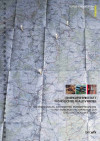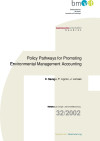Suchergebnisse
Analysis for positioning a R&D-focus on "Building integrated Photovoltaic" in Austria
This study investigates if technologies of building integrated Photovoltaic could be developed and produced in Austria for being competitive on the global market. What starting position of the national PV industry and research is given and what steps are needed in order to seize this opportunity.
Gründerzeit mit Zukunft - Subprojekt 2: Grundlagen und Machbarkeitsstudien
Zusammenfassung und Aufbereitung vorhandenen Wissens zur Sanierung von Gründerzeitgebäuden als Input für die Vorbereitung der 5 Demonstrationsprojekte sowie die Erarbeitung von Grundlagen für das begleitende Monitoring im Rahmen des Leitprojekts "Gründerzeit der Zukunft".
aspern Die Seestadt Wiens - Subprojekt 8: Leitprojektmanagement aspern+ 2011
Das Leitprojektmanagement beinhaltet die Abwicklung und Betreuung der Subprojekte, die regelmäßige Berichterstattung an das Programm-Management und die Aufbereitung sowie Verbreitung der einzelnen Ergebnisse. Darüber hinaus sollen Synergien zu anderen Leitprojekten aufgezeigt und berücksichtigt werden.
ECR Energy City Graz - Subprojekt 2: Rahmenplan Energy City Graz-Reininghaus
Projektziel sind die wissenschaftliche Bearbeitung und das Aufzeigen der Vision des energieautarken, CO2-neutralen Stadtteils Graz-Reininghaus. Durch das Projekt Rahmenplan Energie City Graz-Reininghaus soll in Graz und in der Steiermark ein Umdenkprozess in Richtung energieeffizienter und nachhaltiger Stadtentwicklung eingeleitet werden.
Operational and maintenance costs in passive houses and low energy houses
How much energy does a passive house actually save? Does a passive house pay-off by itself? What are the costs for maintancence? For the first time an approximation for the running costs of a passive house were systematically documented and compared.
Stadtumbau Lehen - Subprojekt 1: Grundlagenstudie intelligentes E-Monitoring
Ziel war es das Energie-Monitoring im geförderten Wohnbau weiterzuentwickeln und Möglichkeiten zu finden, den Energieverbrauch transparent zu machen und mit den "Soll-Verbräuchen" zu vergleichen, um zeitgerecht Rückmeldungen zu bekommen und auch an die Nutzer weiterzugeben. Verschiedene Monitoring-Systeme in Europa wurden recherchiert und Erfahrungen ausgewertet.
Reduktion der Wartungskosten von Lüftungsanlagen in Plus-Energiehäusern
Die Wartungskosten einer Lüftungsanlage sind ein wichtiger Bestandteil der Betriebskosten eines Plus-Energiegebäudes. In diesem Projekt werden die Wartungskosten von Lüftungsanlagen in gebauten Passivhäusern gegenübergestellt.
Vorzeigeregion Energie – “Innovationen für den Klimaschutz Made in Austria”
29. September 2020 , 13:00 - 18:00 Uhr
Ars Electronica Center, Skyloft, Ars-Electronica-Straße 1, 4040 Linz sowie Online-Live-Übertragung
Das Jahresevent der Vorzeigeregion Energie informiert über die aktuellen Entwicklungen und Erfolge dieser FTI-Initiative und die Fortschritte der drei Vorzeigeregionen.
Mission Innovation Austria Online-Veranstaltung Dialog in Fokusgruppen "100% erneuerbare Wärme und Kälte in der Industrie"
17. Mai 2021, 09:00 – 11:00 Uhr
Online
Die Technologie- und Innovationsplattform für erneuerbares Heizen und Kühlen (RHC-ETIP) erarbeitete einen umfassenden Forschungsfahrplan (Strategic Research and Innovation Agenda, SRIA) für die europäische Industrie. Übergeordnetes Ziel ist die Erreichung einer 100% erneuerbaren Wärme- und Kälteversorgung und die Ableitung dafür notwendiger Forschungs- und Entwicklungsschritte.
Kreislaufwirtschaft als Perspektive für langlebige und funktionelle (Bio-)Kunststoffe
25. April 2022, 9:30 – 16:00 Uhr
Bundesministerium für Klimaschutz, Umwelt, Energie, Mobilität, Innovation und Technologie (BMK), Festsaal, Radetzkystraße 2, 1030 Wien
Die Anwendungsmöglichkeiten von langlebigen Kunststoffprodukten sowie die Beweggründe für deren Einsatz in einem umweltfreundlichen, kreislauforientierten Wirtschaftssystem sind vielfältig. Ansätze der Kreislaufführung sowie die Möglichkeiten der Umstellung auf Biopolymere für langlebige Kunststoffprodukte werden vorgestellt und diskutiert.
ÖkoInform - Platform for Exchange of Information in Green Building

A platform for the exchange of information to promote the better integration of ecological materials and renewable resources in the research programme "Building of Tomorrow"
Energiewerkstatt Nördliches Waldviertel

Ein kommunales "integriertes" Energieprogramm - durch Forschungskooperation zur erfolgreichen Umsetzung
Forschungsforum
1/1996
Herausgeber: BMVIT
Deutsch, 6 Seiten
Downloads zur Publikation
Berichte aus Energie- und Umweltforschung 32/2002Policy Pathways for PromotingEnvironmental Management Accounting

Implementation of EMA as a standard tool regarding the calculation of environmental and material (flow) costs - a project report on a procedure that may form a new basis for the calculation of financial profitability of business optinons of sustainability.
Schriftenreihe
32/2002
D. Savage, P.Lignon, J. Lomsek
Herausgeber: Im Auftrag des Bundesministeriums für Wissenschaft und Verkehr
Englisch, 99 Seiten
Downloads zur Publikation
Thementag Smart Cities - Landinger Sommer 2016
21. Juli 2016
HösshalleHinterstoder, AT
Der Landinger Sommer ist ein sommerlicher Mix aus kreativen Köpfen, aktuellen Themen, inspirierenden Projekten und erholsamen Tagen. Dort wurde wieder über Smart Cities vor einer beeindruckenden Bergkulisse diskutiert, mit den Hinterstoderern "Bänkle gehockt" und die lokalen Schmankerln durchprobiert. Das eigentliche Programm entsteht jedes Jahr zum größten Teil vor Ort. Christof Isopp von der Landinger OG wurde vom BMVIT eingeladen ein Konzept für den Thementag Smart Cities 2016 zu erarbeiten und diesen durchzuführen.
Wie gut ist das Klima in Ihrem Gebäude?
27. September 2021
Inffeldgasse 13, Hörsaal HSi8 EG, Graz, AT
Neue Lösungen für mehr Behaglichkeit und bessere Energieeffizienz. Im Projekt COMFORT wurden Behaglichkeitsbedingungen in Räumen und Gebäuden erfasst und analysiert. Erfahren Sie in diesem Workshop, wie man Gebäudetreibern durch umfangreiche Datenanalysen und virtuelle Sensoren zukünftig eine individuelle Betreuung, Beurteilung und Optimierung von Gebäuden ermöglicht.
Studien und Publikationen aus Österreich
Thementag Smart Cities - Landinger Sommer 2017
13. Juli 2017
Hinterstoder 28, 4573 Hinterstoder, AT
Der Landinger Sommer ist ein sommerlicher Mix aus kreativen Köpfen, aktuellen Themen, inspirierenden Projekten und erholsamen Tagen. Dort wurde wieder über Smart Cities vor einer beeindruckenden Bergkulisse diskutiert, mit den Hinterstoderern "Bänkle gehockt" und die lokalen Schmankerln durchprobiert. Das eigentliche Programm entsteht jedes Jahr zum größten Teil vor Ort.
Fachforum: City Dialog. Die Stadt der Zukunft
2. Dezember 2011
Wirtschaftskammer Kärnten - Technologiepark9524 Villach, AT
Vor welchen Herausforderungen stehen die Städte der Zukunft? Fachforum mit ExpertInnen aus Wirtschaft, Verwaltung und Wissenschaft über Ideen zum Thema Stadt der Zukunft und zum Erkennen der Marktchancen von Urban Technologies.
"Haus der Zukunft Plus" - 3. Vernetzungsworkshop
22. Mai 2012
FFGWien, AT
Der Workshop diente der Vernetzung der ProjektnehmerInnen der 3. Ausschreibung von “Haus der Zukunft Plus” und bot den TeilnehmerInnen eine Möglichkeit zum Informationsaustausch. Ein weiteres Ziel war die Information über das Forschungsprogramm und über Projekte der ersten beiden Ausschreibungen.
Was ist so schön am Eigenheim - Ein Lebensstilkonzept des Wohnens

Motive hinter dem Wunsch auf eine bestimmte Art zu Wohnen - hier vor allem das Wohnen im Einfamilienhaus - erklärt über ein Lebensstilkonzept Mag. Winfried Moser, Dr. Dieter Reicher, Mag. Rainer Rosegger, Mag. Monika de Frantz, Mag. Margarethe Havel
